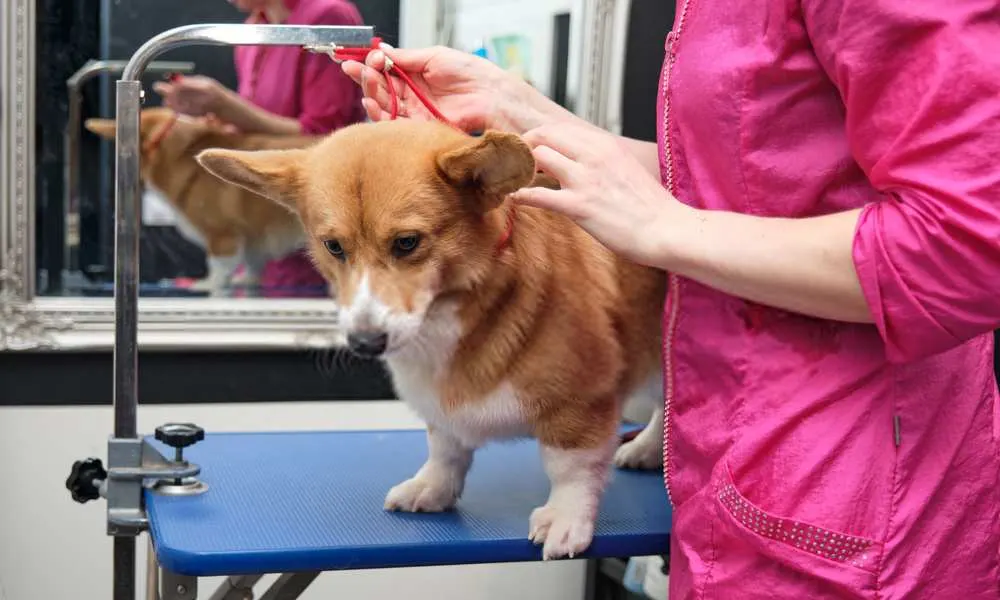Any kind of indication that something might be wrong with the health of your corgi should not be ignored. If you notice the slightest changes in their behavior or appearance, you should take your corgi to get checked immediately. Sometimes, it might not look bad, but it really is.
As you probably already know, the corgi breed is not famous for being the healthiest. There are many diseases they deal with over the years, and they can turn out to be pretty serious.
So, you might find yourself wondering – do corgis get cancer? Is this something that can happen to your pet as well?
If you are an owner concerned for your dog’s health and safety, then don’t miss a chance to get all the information you need about severe diseases like cancer and how they affect your corgi.
Continue reading our article, and we will explain everything to you.

The Threat – Are Corgis Prone To Cancer?
Corgis are a very delicate breed when it comes to their health – they require a lot of checkups at the vet during the year. Sometimes, you might be dealing with a mild health problem that can be treated by antibiotics, and sometimes the situation is much graver. When we say serious, we mean cancer.
Are corgis prone to cancer? Sadly, yes.
Cancer is an invisible enemy that can occur basically everywhere in a dog’s body and spreads through lymphatic or circulatory systems to other parts and destroys them. This is a disease that is most common with dogs who are ten years and older.
Although this disease is fatal in most cases, some cases can be treated, but you have to go to the doctor in time. Thanks to the technological and medical development in veterinary, there is a chance that you can cure your corgi.
The signs that indicate cancer vary, so you must be on the look-out for any differences in your corgi’s behavior, pain tolerance, and appearance.
Here are the main symptoms:
- Evidence of pain
- Abnormal odors
- Blood coming from ears or mouth
- Abdominal swelling
- Sudden weight loss
- Coughing
- Difficulty breathing
- Depression
- Tiredness
- Change in appetite
- Changes in bathroom habit
- Any lumps or bumps visible on the body
If you notice anything from the list above, you should hurry and make an appointment with the closest veterinarian to get the diagnosis. With diseases like this one, time is of the essence.

The Types
Now that we have gone over the symptoms, let’s focus on explaining the types of cancer your corgi might be dealing with, and which one is the most common for this breed.
| MAST CELL TUMORS | Mast cell tumors are the most common cell tumors that can occur somewhere in the dog’s liver, bones, and spleen. These cells are supposed to be in charge of protecting the body from harmful outside influences, but in this case – they are the ones causing the harm. This is the result of numerous lumps and bumps on the dog’s body. If diagnosed on time, it can be surgically removed, but the risk is high. |
| HEMANGIOSARCOMA | Hemangiosarcoma is cancer that affects the blood vessels. It is very dangerous and progresses quicker than other types of cancer. This type can occur at any time, and the dog doesn’t have to be in his late years. This cancer has no mercy, and it can lead to hemorrhages, which can leave the dog with severe internal bleeding and collapses. When your dog passes five years of age, get him checked just in case. |
| LYMPHOMA | Lymphoma is cancer that affects the immune cells called lymphocytes. It can occur at any age, and the signs involve swelling of lymph nodes behind the dog’s neck, knees, or on his shoulders, weight loss, and lethargy. The treatment for this kind depends on the stage it is discovered at. The good news is that the types that are not so serious can be treated with medication and antibiotics. |
| MELANOMA | Melanoma is a type of cancer that affects the so-called pigment cells. It is a large black or brown mass, and it needs to be surgically removed when found. If melanoma can’t be cured 100%, then the dog is given some medication and has to undergo therapy, which will slow down cancer progression. |
| MOUTH AND NOSE CANCER | Mouth cancers are more common than nose ones. You will notice this by constant drooling, swelling, and sometimes even bleeding from the mouth or nose. These tumors can be challenging to treat, so the sooner you make an appointment and start therapy, the better. |
| BRAIN TUMORS | Brain tumors are an extremely dangerous type of cancer. Your dog might start having frequent seizures, difficulty walking and breathing. Overall, if your corgi seems tired for more than two days, something is definitely wrong. For this type to be diagnosed and treated right, you will have to take your dog to do an MRI or a CT test. This will tell you the exact location of the tumor and will help in further treatment. |
| HISTIOCYTIC | Histiocytic cancer is found in immunological cells found in the legs of your dog. Since corgis are prone to joint problems, there is a chance that this is something they are dealing with. Sadly, this type of cancer progresses at such a pace that there is often little room left for any kind of treatment, and the dog is going through immense pain. |
According to reported cases, the most common cancer that corgis suffer from is lymphoma cancer. Research states that 28.4% of corgis pass away from cancer.

The Cure
When it comes to cancer patients, treatment depends on the stage of cancer, the seriousness of the current situation, and the type of course. There are three main ways of curing cancer: chemotherapy, surgery, and radiation therapy. Before rushing to the doctor’s office, let’s explain how each of them works.
- Chemotherapy: Whether it is a dog or a human, chemotherapy is the most common way of treating cancer. Its job is to slow down and hopefully destroy cancer cells that are spreading. Some evident side-effects of chemotherapy are nausea and hair loss. While some dogs only need this as a treatment, others have to undergo surgery before starting chemo. And this can be very difficult for your pet.
- Surgery: Surgery is most commonly offered as a first option when dealing with any type of cancer. It’s a great way of precisely determining where the starting point of cancer is. Surgery can also prolong the life of your corgi and reduce pain.
- Radiation therapy: Radiation therapy can be a bit harder to get a hold of if you do not live in a larger city with better-equipped hospitals. It uses x-rays to minimize the cells that are destroying the internal organs of your dog. In combination with surgery, it can be beneficial and provide excellent results.
This is not something that should be taken lightly. Bear in mind that every case is unique and that you should first go and see the doctor – after all, they know best what is best for your corgi’s treatment.

The Other Diseases
Cancer may be the most dangerous disease that can happen to your corgi, but it certainly is not the only one. There is a long list of health threats that you should be aware of, and we are going to list them down one by one:
- Dental diseases – corgi dogs suffer from dental problems such as gums from an early age, and if this is not treated in time, it can spread and affect other organs such as kidneys, liver, etc.
- Infections – their double coat can cause you some serious problems. Since they shed a lot, naturally, they attract many bacteria and are prone to skin infections. It would be best if you did not skip on the grooming.
- Obesity – overweight corgis are not unusual at all. This breed loves to eat, and their owners love to see them chubby – but this is not good at all for the dog. Their small bodies are not used to carrying all that weight.
- Bleeding disorders – This can be a tricky problem because it can vary from small external bleeding to severe internal bleeding – you never know. Von Willebrand’s disease is the most common one – it involves clotting the blood cells.
- Back problems – there is a 90% chance that your corgi will have back problems at some point in his life. You may notice that he is having difficulty walking, sleeping, or even standing for a longer period. Check your dog for IVDD.
- Hip dysplasia – this health problem can be excruciating for the corgi because he will feel pain every time he moves. You can avoid this problem by getting an X-ray and doing a lot of exercises daily.
- Eye problems – at some point, you might notice that your corgi is becoming more clumsy and bumping into things around the house. This is probably because he is having problems with his vision in the form of cataracts and progressive retinal atrophy. Don’t worry, and this can be treated with medication.
- Epilepsy – having epileptic attacks can pose a severe dog problem, especially for a small-sized one like corgis. Epilepsy comes in different types of seizures: reactive, secondary, and primary. Each one of them is dangerous and should be treated immediately. The sad thing is that this can leave some severe consequences on your corgi in the long run.
- Reproductive problems – this particular problem is more common with females than male corgis, and sadly, it is inherited. There are a lot of difficulties that can occur during the birthing process, and you can be aware of this only if you are familiar with the history of the mother.
Learn More: Genetic Diseases In Corgis

The Facts You Didn’t Know
Let’s put a stop to all the possible health threats that concern this breed and its owner, and let’s turn to some fun facts about corgi dogs.
Here are some interesting facts about corgi dogs that you might didn’t know before:
There is a corgi meetup hosted in southern California.
- In southern California, there is a large corgi meetup three times in one year. It started in 2012, and it has been going on since then. The last one included more than 1000 corgis.
Corgi means “dwarf dog” in Welsh.
- You are well-aware of the rich history behind the breed, but one interesting fact is that when you translate it, it means dwarf dog. Could they be magical creatures?
Corgis were used to predict the Princesses’ name.
- Yes, it’s true. When Princess Kate and Prince William were expecting their second child, ten corgis with vests took part in a race to predict the Princesses’ name. Princess Charlotte was born on May 2nd, 2015.
The royal family is a fan of the Pembroke breed.
- It is no secret that the Queen is a corgi lover – she had them all her life, more than 30. She got the first one in 1933 as a gift from her dad, King George VI, and the tradition goes on from there.
According to the legend, fairies used to ride corgis.
- Some history books claim that fairies used to ride corgis into battle 100 years ago and that the markings on their coats are saddles of fairies.
Corgis were originally herding dogs.
- Although it’s hard to imagine such a small dog doing such an exhausting job, it’s true. Three thousand years ago, corgis were herding dogs, and they used to carry cattle from the farms to the market. Who would have guessed it?
AKC grouped the Pembroke and Cardigan breed into one.
- For a long time, the American Kennel Club made no distinction between the two breeds and grouped them as one. Finally, this changed in 1934, and they gained separate recognition.
The Cardigan Welsh corgi is older.
- When it comes to the time frame between the breeds, the Cardigan wins by almost 1000 years. The Cardigan Welsh corgi belonged to the Teckel dog family.

Conclusion
Like any other concerned owner, you want your dog to maintain perfect health and live a long and happy life. However, there are always going to be some bumps on the road for you and your dog. For example, if we take the corgi breed, they are not the healthiest breed out there, and you might have to visit the vet more frequently.
Cancer is a disease that affects many dogs, and corgis are not an exception. There are many types of cancer that your corgi might suffer from, and they vary in seriousness and treatment ways. We have mast cell tumors, hemangiosarcoma, melanoma, mouth and nose cancer, brain tumors, and many more. The most common type of cancer in corgis is lymphoma cancer, which affects lymphatic, immune cells in their body.
The signs that might indicate that your corgi is at threat of cancer are excessive drooling, abnormal odors, pain in the abdominal area, swelling, bumps, and bleeding. The treatments differ according to what your corgi is dealing with. You have the choice between chemotherapy, radiation therapy, and surgery.
Unfortunately, cancer is not the only disease your corgi will have to deal with during his lifetime. A long list follows this, including hip dysplasia, eye problems, heart diseases, back problems, epilepsy, reproductive problems, obesity, and dental disorders. You might not be able to avoid the entire health issue, but you can slow it down and treat it right from the start by going on regular checkups to the vet.
Health issues should not be the primary reason that connects you to your corgi. You should know some interesting facts about them as well. For example, the Cardigan breed is the older one. The American Kennel Club distinguished the two breeds in 1934. The Queen of England loves the Pembroke breed and has had more than 30 corgis in her life. The corgi breed has a rich history that involves fairies, “dwarf dogs,” and moving cattle from the farms to the markets.

